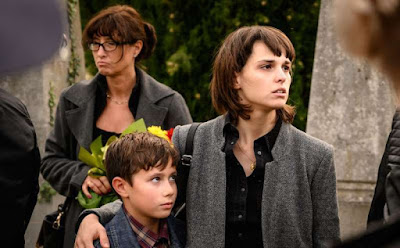The son of a Holocaust survivor who lives in Trieste as a surgeon begins to doubt his actions of refusing to help a victim of a traffic accident that he encountered on his way home from work.
Mauro Mancini’s first full-length film is somewhat of an obtuse and hypocritical narrative journey. An emotional viewing that seeks to show love and understanding can overcome hate, through the consequences of a series of poor decisions. In a manner of speaking, these ill-judged actions help to put forth a real and flawed character yet, on the other hand, it undermines its own message through poorly constructed romantic elements.
The setup for the film comes in two heavy-handed strokes. Firstly, Simone Segre, our protagonist (as a child) is forced to pick a kitten and drown the remainder of the kittens in the kindle, at the behest of his father. Secondly, Segre (now an adult) alone from any outside influence, chooses to let a stranger in a car accident die.
Of course, one can immediately argue the bluntness of my summary, but pointing out the stranger was already suffering from blood loss and had a low chance of survival on his own, was involved in white supremacy groups, had several nazi tattoos, the protagonist's direct family was held prisoner in German concentration camps, and the protagonist himself was seemingly raised by a cruel father, but in the end, Segre provided first aid, increasing his chance of survival immensely, and then removed his first aid, guaranteeing the man's death. As far as the first five minutes of any film can be judged, this is an incredibly hard-hitting and polarizing narrative to be introduced to our main character with. From this point on, Segre is on the path of redemption as his guilt overpowers his self-preservation instinct.
From a cinematography standpoint, the film is beautifully crafted. Set pieces and environments are well choreographed, with an interesting use of light as a means of highlighting the inequality between our characters. No matter the gorgeous visuals or the emotional strength of Alessandro Gassman's (Segre) acting, the motives and morals are far too muddled to effectively navigate through the narrative of this piece.
There are two main emotional arcs that run through Thou Shalt Not Hate, and as the film's name suggests, they both revolve around the concept of hate. One looks at the racial undertones of the Jew-Nazi pairing, putting an indoctrinated hatred of other ethnicities against anger for past atrocities against their people. The second arc looks more into the internal hate that stems from the influences of their fathers. There is a burgeoning plethora of conflicting emotions that Gassman is able to portray brilliantly as his guilt forces him to develop a relationship with the family of the man he killed.
The screenplay by Mauro Mancini and Davide Lisino provides several opportunities to develop its characters by placing them in a number of difficult situations and seeing how they react but fails to properly develop its antagonist to a point that is fruitful. The source of Marcello's rage is never identified and is never suitably resolved. Segre's redemption is muddied by a romantic element that again throws his ethics and morals into question yet again as his wealth turns any love interest into a manipulative power play.
The reconciliation and overcoming of anger in light of redemption and second chances is a lovely thought. The underlying narrative that the ends justify the means is, however, unnerving. The justification of killing a father to end the hate and break the vicious cycle of racial abuse was unexpected. None of the film's shock-value events receive any consequence, and it loses some credibility because of that.
It's beautifully shot, and the emotions are raw and authentic (especially the spite and hatred from Marcello, portrayed by Luka Zunic), but the lack of consequence tells a tale that the screenplay did not mean to promote. The push for a romantic twist further draws our protagonist away from earning his redemption, and the indirect nature of Segre's meddling comes across as shallow and with an ulterior motive.
Thou Shalt Not Hate is part of the NZ Jewish International Film Festival from the 22nd of July to the 15th of August







